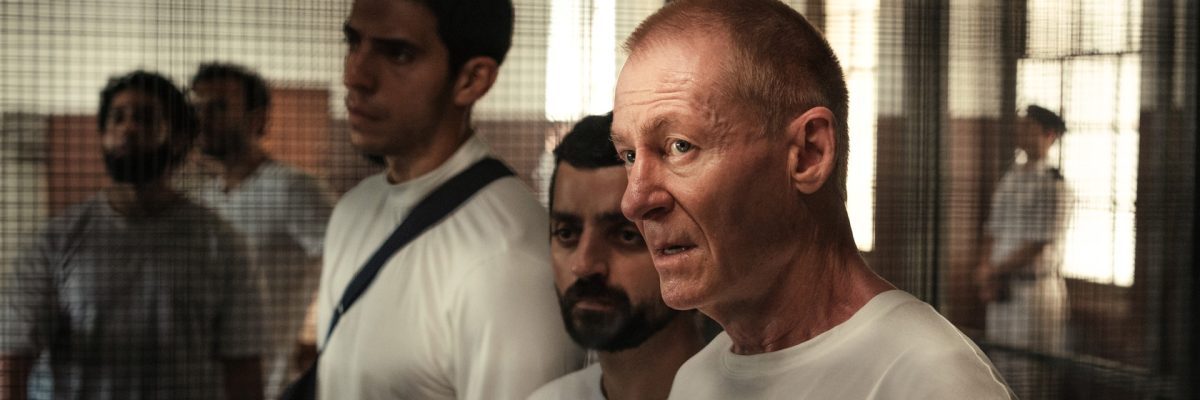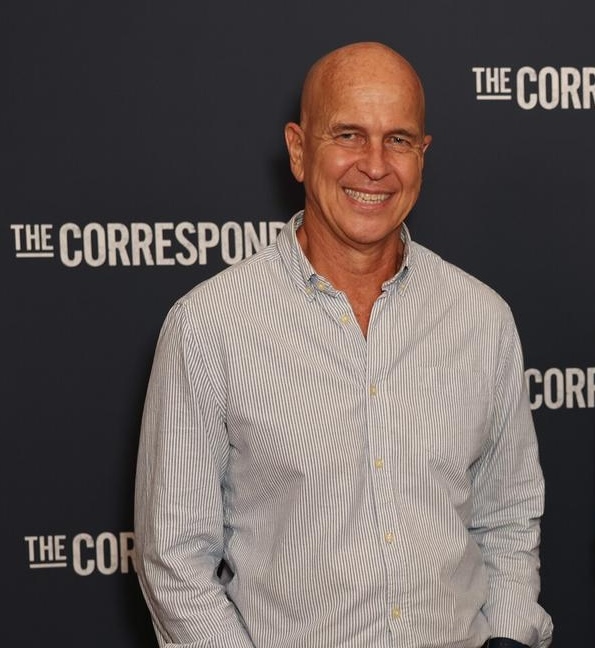
Richard Roxburgh takes on the title role of Australian foreign correspondent Peter Greste in The Correspondent. Photos: Supplied.
The Correspondent is the spellbinding true story of the arrest, trial and imprisonment of Australian foreign correspondent and reporter Peter Greste – a film with an exceptional reinterpretation that’s essential viewing for journalists.
The plot focuses on Greste, a pawn in the brutal war on truth, who was arrested in Cairo in December 2013 and held in an Egyptian prison after being accused of spreading false news and aiding the Muslim Brotherhood. Greste was found guilty and sentenced to seven years in jail.
The biographical legal thriller is directed by Kriv Stenders (Red Dog, Boxing Day) from a screenplay by Peter Duncan, and is adapted from Greste’s 2017 memoir The First Casualty.
Richard Roxburgh, in a career-best performance, depicts the jailed Al Jazeera journalist as a pragmatic but deep-thinking individual in The Correspondent.
The political scene is volatile as Greste (Roxburgh, Moulin Rouge!, Rake) arrives in Cairo to cover for a reporter on Christmas leave. The political temperature across Egypt is high as Abdel Fattah Al-Sisi’s military takeover of the democratically elected Egyptian government is all but complete. The revolutionary students who’d filled Tahrir Square for more than a year have been disbanded, imprisoned or executed.
A veteran of Middle East conflict reportage, Greste is alert but not alarmed – though he’s unaware of the depth of Sisi’s hatred of the Australian’s current employer, Al Jazeera, for its reporting of the coup. From the moment he steps foot in Egypt, a plan is set in motion to arrest Greste and his crew. What unfolds is a descent into a Kafkaesque nightmare in which Greste is seen as collateral damage in the struggle for accuracy.
Al Jazeera wanted Greste to keep watch with Egyptian-Canadian producer Mohamed Fahmy (Julian Maroun) and local cameraman Baher Mohamed (Rahel Romahn).
Armed government forces push their way into Greste’s hotel room. His safe is raided, his computer seized, and he’s taken in for questioning. Fahmy soon joins him, his shoulder broken. Fahmy thinks he can sort this out, but their interrogators attack from every angle.
When the trio is accused of terrorism and broadcasting false information with an intent to destabilise Egypt, Greste assumes there’s been a terrible mistake that will soon be resolved. That was not the case.

Australian war correspondent Peter Greste. The Correspondent is based on his time in an Egyptian prison after being charged with spreading false news and aiding a terrorist organisation while working for Al Jazeera.
Global headlines reveal the gravity of their situation. Powerless. Vulnerable. Defenceless. Greste recognised that the only way through this situation was to make “a case to the world because now was the time for pressure”. They were pawns in a political game. The moment called for action.
As he states in the film: “I’ve been caught in the middle of a multi-headed political struggle. So, our arrest here is not a mistake.” His voice was becoming an echo chamber in the West. He was no longer covering a story, he was the story!
“I can no longer pretend it will go away by keeping quiet,” Greste writes in his diary in prison. “We will never give up. As a journalist this is my battle.”
At its core, The Correspondent is a highly personal story – one about human beings caught up in a complex and dangerous situation they had no control over.
Greste knew there were no rules in this game, but he wanted to keep believing that justice would somehow reach him. Suddenly, without explanation, after spending 400 days in an Egyptian prison, he is released and flown back to Australia, without pardon, and to this day, remains a convicted terrorist under Egyptian law.
“I wrote The First Casualty – referencing the oft used quote ‘the first casualty of war is truth’ – because I wanted to tell the story not just of what happened to my colleagues and me in Egypt, but to place it in the wider context of the way I saw journalism itself coming under fire since 9/11.”
For producer Carmel Travers, a former journalist and foreign correspondent, there was fear tempered with how she had observed such situations usually playing out.
“… We saw it getting harder and harder for journalists to report in an unfettered way, not just on major international conflicts, but domestically,” Travers says. “A growing number of limitations and legislative blockages, in many countries, were being placed before the telling of the news.”
What transpired were 14 months of grim desperation for Greste and his colleagues. The unexpected release of Greste in February 2015, and the subsequent release of Fahmy and Mohamed several months later, were major stories that played out within very serious concerns about the growing threats to journalism and journalists globally.
The Correspondent, directed by Kriv Stenders, is streaming on Amazon Prime and AppleTV+



